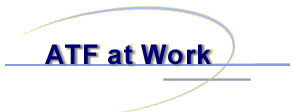


As suggested by its name, and unlike such agencies as the Internal Revenue Service and the Drug Enforcement Administration, the ATF over the years has been assigned a variety of responsibilities that are not always obviously connected.
The relative lack of focus is reflected in the agency's grandly amorphous mission statement: "ATF is a law enforcement organization within the United States Department of the Treasury with a unique combination of responsibilities dedicated to reducing violent crime, collecting revenue, and protecting the public."
To deal with these vast challenges the ATF has set up a multitude of specialized programs. Among them are the following:
In addition, of course, the ATF is responsible for the fair and effective collection of federal taxes levied on alcohol and tobacco products.Four special ATF Arson and Explosives Task Forces offer communities specialized assistance in the wake of serious incidents.
The agency's Achilles program attempts to identify and remove "the most dangerous, armed career criminal and drug traffickers from our communities."
A Criminal Firearms Trafficking Program aims at identifying and prosecuting those individuals around the country who are illegally supplying firearms to violent criminals.
A National Tracing Center assists state and local agencies by tracking the movement of firearms.
The Youth Crime Gun Interdiction Initiative (YCGII) seeks to identify and investigate "the illegal sales of guns to youth/juveniles and to shut down traffickers" in 27 cities.
The goal of a program called G.R.E.A.T. (Gang Resistance Education and Training) is to "decrease gang activity by teaching special courses" to fourth and seventh graders.
The ATF's Firearms Licensing Program joins with state and local authorities to ensure that the 104,855 federal firearms licensees operate in compliance with all laws.
Yet another program protects consumers by preventing false or misleading claims on alcohol beverage labels and identifying and correcting situations where explosives are improperly stored.
Given the small size of the ATF, only 3,988 employees in 1998, and the vast size of the United States, the goal of reducing violent crime and protecting the public against other unnamed dangers and regulating the tobacco and alcohol industries is exceedingly ambitious. A summary of possibly relevant incidents on the ATF Web Site suggests just how thinly the agency is stretching in providing useful assistance in just one of the above programs. From 1991 to 1995, the agency reported, there were 8,582 bombings and 2,506 incendiary bombings in the U.S.
| ATF at Work | TRAC-ATF |
